Committee Seeks San Onofre Emails Again
by Jeff McDonald, San Diego Union-Tribune

The chairman of the Assembly committee that oversees the California Public Utilities Commission has given the agency until the end of this month to secure and turn over certain emails and other documents from Southern California Edison. Chairman Anthony Rendon, D-Lakewood, is asking Commission President Michael Picker to use his authority to demand that Edison provide internal and external emails about the failed San Onofre nuclear plant north of Oceanside. … [The] plant has become a key subject in criminal investigations of the state utilities commission. Much of the scrutiny revolves around private communications between regulators and utility executives. Read More ›
UCLA Health System Data Breach Affects 4.5 Million Patients
by Chad Terhune, Los Angeles Times

This cyberattack at UCLA comes on the heels of a major breach of federal employee records and a massive hack at health insurance giant Anthem Inc. affecting 80 million Americans this year. The intrusion is raising fresh questions about the ability of hospitals, health insurers and other medical providers to safeguard the vast troves of electronic medical records and other sensitive data they are stockpiling. The revelation that UCLA hadn’t taken the basic step of encrypting this patient data drew swift criticism from security experts and patient advocates. Read More ›
Aetna’s 21% Rate Hike Amounts To ‘Price Gouging,’ California Regulator Says
by Chad Terhune, Los Angeles Times

“Aetna’s pattern of unreasonable increases equates to price gouging in today’s market,” [said Shelley Rouillard, director of the California Department of Managed Health Care.] … Overall, the managed-care agency has found six rate increases unreasonable since 2011, and four of them were from Aetna. In May, the regulator found Aetna’s 19.2% increase for small employers unreasonable. But California officials have no power to stop health insurance rate increases. Read More ›
Out-Of-Network Costs Lurk Even At In-Network Hospitals
by Chad Terhune, Los Angeles Times
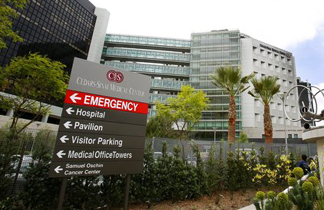
A recent report by Consumers Union found that nearly 1 in 4 Californians say they were charged out-of-network rates when they thought that a provider was in-network. Most of these people — more than 6 in 10 — assume that doctors at an in-network hospital are also in-network, yet that’s often not the case. Federal law doesn’t protect patients from surprise bills. The Affordable Care Act requires insurers to cover out-of-network emergency services at in-network rates, but it doesn’t stop doctors from balance billing. … As it stands today, the healthcare system has consumers over a barrel. Read More ›
Regulator Went To Power Event In Napa
by Jeff McDonald, San Diego Union-Tribune

“To my knowledge, the Western Power Trading Forum is one big opportunity to have an illegal ex parte with any commissioner that the group can convince to come and talk to them,” said former commission President Loretta Lynch, now an attorney in private practice. “In some of the most luxurious settings, groups like WPTF wine and dine commissioners while engaging in private, backroom conversations concerning issues directly in front of the PUC. … All Californians should question whether PUC proceedings are appropriately decided, and we should all ask our legislators and the governor to stop this corrupting practice.” Read More ›
Uber Should Be Suspended In California And Fined $7.3 Million, Judge Says
by Laura J. Nelson, Andrea Chang and Paresh Dave, Los Angeles Times

Uber — plagued by problems with regulators, drivers and taxi unions around the world — took a big blow in its home state Wednesday when an administrative judge recommended that the ride-sharing giant be fined $7.3 million and be suspended from operating in California. In her decision, chief administrative law judge Karen V. Clopton of the California Public Utilities Commission contended that Uber has not complied with state laws designed to ensure that drivers are doling out rides fairly to all passengers. Read More ›
US Senate Panel Reverses Course On Rentals Of Recalled Vehicles
by Jeff Plungis, Bloomberg News
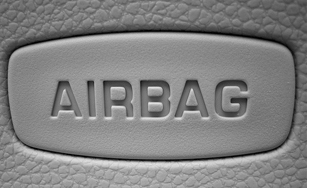
A Senate panel killed a proposal to permit companies to continue renting vehicles that have been recalled, a measure criticized by consumer groups, automakers and even some rental-car companies. The Commerce, Science and Transportation Committee instead voted Wednesday to require cars be repaired before they’re rented. … Democrats introduced an amendment that failed on a party-line vote to give [the National Highway Safety Administration] more funding and allow jail time for executives who hide auto-safety defects. Read More ›
Consumer Groups Urge CFPB To Provide Better Oversight, Rules Over Student Loan Servicing
by Ashlee Kieler, Consumerist

A 2013 report from Consumers Union included anecdotal claims of servicer incompetence, like the borrower who was being charged more than twice the interest rate he was supposed to pay. More recently, the CFPB found that some student loan servicers took part in several illegal and shady practices. … Student loan servicing stands today where mortgage servicing stood over a decade ago: critically important and largely ignored. Read More ›
2 New Warrants Served In CPUC Case
by Jeff McDonald, San Diego Union-Tribune
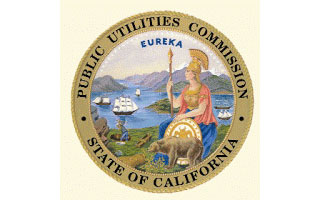
The criminal investigation of the California Public Utilities Commission appears to be intensifying, with state agents serving a fresh round of search warrants at the regulators’ headquarters in San Francisco and at Southern California Edison offices outside Los Angeles. The Attorney General’s Office wants details about a settlement agreement that assigned Southern California ratepayers to cover $3.3 billion in shutdown costs for the San Onofre nuclear plant, which closed on an emergency basis in January 2012 after Edison installed faulty replacement steam generators that caused a radiation leak. Read More ›
California Electricity Rates To Undergo Biggest Change In 15 Years
by David R. Baker and Hamed Aleaziz, The San Francisco Chronicle
California regulators radically revamped the way electricity rates work in the state, approving changes Friday that will raise monthly utility bills for the most energy-efficient homeowners while giving many bigger energy users a break. … “This is a lose-lose for customers, but business as usual for the CPUC, which has once again done PG&E, Edison and SDG&E’s bidding,” [said Mark Toney, head of The Utility Reform Network, a consumer group. … Changing the number of tiers and cutting the difference between them will raise bills for the most energy-efficient households. Read More ›
California Tax Officials Blast Blue Shield In Audit
by Chad Terhune, Los Angeles Times

Blue Shield’s operations are indistinguishable from those of its for-profit healthcare competitors, the auditors found, and it should be stripped of the tax break it has enjoyed since its founding in 1939. The insurance giant does not advance social welfare, the key test for preserving its tax exemption, according to the records. … Since the revocation became public, Blue Shield has come under increasing scrutiny from regulators, lawmakers and consumer groups over its massive financial reserves and its proposed purchase of a Medicaid insurer for $1.2 billion. Read More ›
Con Artist Exploits A Grandmother’s Love Of Family
by Nancy Peverini, commentary in The Sacramento Bee
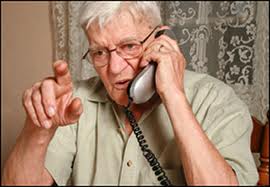
Even though the plot was foiled, it destroyed my mother’s sense of independence. She felt guilty and embarrassed – a common reaction that allows these scams to continue because many of our elderly do not want others to know that they fell for a scam. … We need to ring the bell more so our parents will be protected. According to some estimates, seniors account for 30 percent of all financial fraud. Consumer groups have tips to avoid getting ripped off. …Definitely don’t provide your credit card information. Read More ›
Former Top CPUC Director “Disgusted” By Behavior Of Leadership
by Tony Kovaleski, Liz Wagner and Mark Villarreal, NBC Bay Area
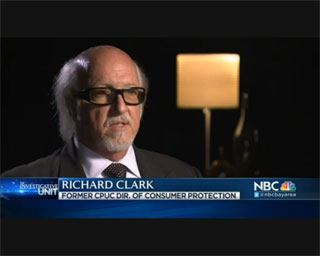
A former high ranking member of the California Public Utilities Commission spoke out for the first time since retiring from the agency last fall. In an exclusive interview with the NBC Bay Area Investigative Unit, he called the actions of some of the CPUC’s former leaders “disgusting.” For more than a decade Richard Clark held one of the agency’s most critical positions as Director of Consumer Protection in the Safety Division. He said his decisions to draw an ethical line with Pacific Gas & Electric Company contradicted a culture of improper access and influence. Read More ›